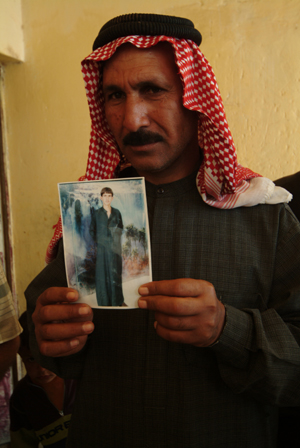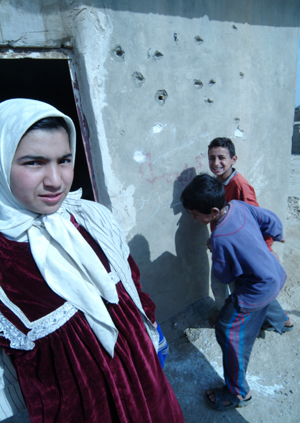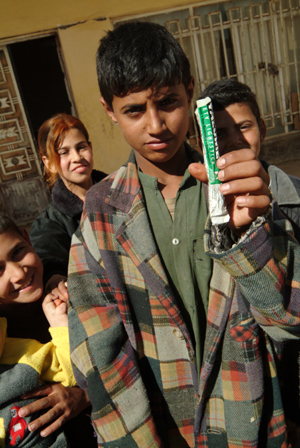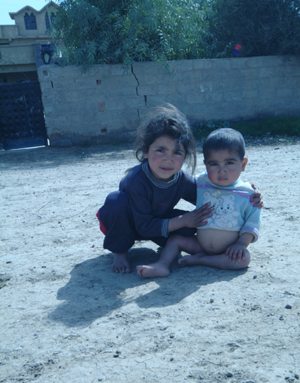The Children of Abu Hishma
Text and Photos by Lorna Tychostup
These photos were taken in Abu Hishma, a farming village of 7,000 in
the Sunni triangle, an area of much armed opposition to the U.S. occupation.
In October, 2003, at the onset of Ramadan, U.S. forces eased back on military
actions against the resistance in the region. Attacks from Abu Hishma
increased. On Nov. 17, a rocket-propelled grenade pierced a Bradley tank,
killing Staff Sgt. Dale Panchot.
The army immediately encircled the five-mile perimeter of the village
with razor wire, leaving only two guarded entrance/exit points. All men
aged 18-65 must carry identification cards written in English. A sign
posted near the wire says, "This fence is here for your protection.
Do not approach or try to cross, or you will be shot."
From this and surrounding villages have come account after account of
U.S.-led midnight raids, lobbing of mortars, demolition of certain homes,
helicopters strafing the countryside with machine guns, random killing
and massive detentions.
Photo #29:
Farmer Fa'ath Musleh Hussein holds up a photo of his 15-year-old
son, Qusay Fiad Musleh, who was detained by U.S. troops on July
14, 2003. Fa'ath visits his son at a prison in Basra approximately
every five weeks when his case comes up for review. Qusay has been
sending notes written on the inside paper of cigarette packs. "I
hope you [in U.S.] can pick a better candidate this election, someone
who knows we want a peaceful life," says Fa'ath. "Both
nations are losing in this war."
|
 |
 |
Photo #83:
This young woman took my hand and brought me up to the roof of
Fa'ath's house to show me these bullet holes. Gesturing to the sky,
she and the children made sounds of rat-a-tat-tat--mimicking the
sound of machine-gun fire as a U.S. helicopter flew past in the
distance.
|
Photo #19:
A boy holds a phosphorus tube and its container. Villagers claim
these tubes are dropped from U.S./coalition helicopters to target
homes that are to be raided. An embedded journalist who went out
on a night raid with troops said these tubes are left at homes that
have already been checked by troops.
|
 |
 |
Photo #49:
A young girl and her brother come to have their photo taken by
one of the first foreign faces to enter their village in 14 years.
The boy cried as I got closer, a common reaction of all the smallest
children in this farming village where new faces strike fear.
|
Lorna Tychostup is an editor, writer and photographer from
Gardiner, N.Y. She filed this report from Iraq.
|